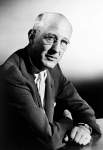It was almost election time, the unpopular war was stalemated, the casualty lists were growing, and the President’s opponents cried “Peace!” Then the new commanding general moved with consummate political as well as military skill
Fifty years ago America went into World War I—singing. Irving Berlin, who put some of the songs upon our lips, recalls for American Heritage those gallant and somehow marvelously innocent days.
When he was reunited with his wife in 1867, Davis' face showed the strains of four years of war and two in prison. For a man of warmth and tenderness who had never wanted the responsibilities of high political office, it had been a cruel ordeal.
Concerned lest history
overlook their triumphs, veterans of the Army of the Cumberland had them writ large -- on a canvas five hundred feet long.
of the Cumberland had them writ large—on a canvas
five hundred feet long
All the old rules seemed to be vanishing in the Twenties. In exchange came a strange new world both gaudy and sad
A Union veteran talks of life in a prison camp: it was bad, yet there were times one could recall happily
When Harry Truman was President of the United States he kept on his desk a little sign with the reminder: “The buck stops here.” This was his way of telling himself that when the responsibility for decision conies to a President, he has to meet it all alone. He can ask for all kinds of advice, and any amount of briefing, but he has to make up his mind by himself. Once in a generation or so his decisions send powerful echoes down the years. They may take the country along a path never before followed, enlarge the powers of the American government itself, or commit the whole nation to a policy or a program that will have permanent and vital effect. At such moments the President has to have vision, courage, and a sense of historic mission. To illustrate the matter, we consider below five moments in time in which a President made a decision whose consequences to the republic still endure.
From the start, Niagara has been over publicized, but somehow its authentic majesty has survived
William Ashley was largely responsible for the development of that most glittering of the West’s romantic figures, the mountain man—the free trapper who explored the western wilderness at imminent peril of his life.






